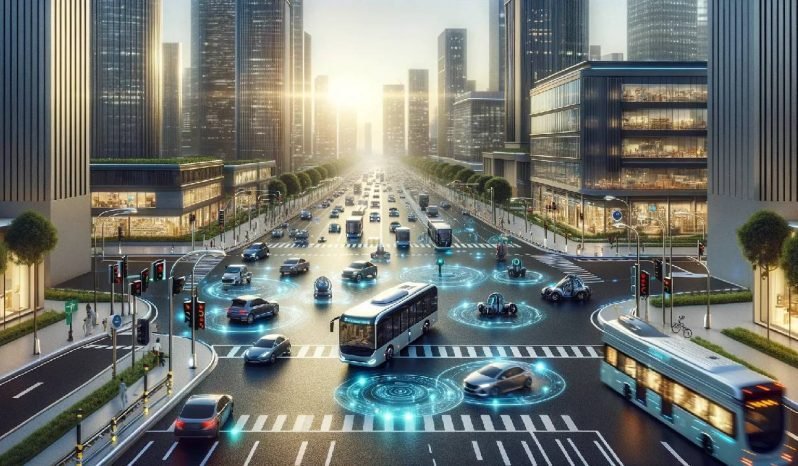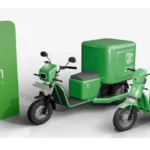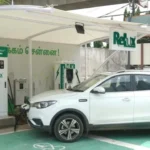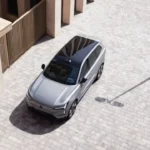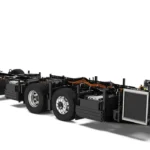The Indian commercial logistics sector is transforming with the adoption of EVs and their synergy with Intelligent Transportation Systems (ITS). This shift is expected to further improve with the introduction of new products in the 4W and 6W segments. The ambitious initiatives aimed at electrifying fleets, expanding charging infrastructure, establishing regulatory frameworks to ensure interoperability and seamless communication protocols, and integrating advanced ITS technologies collectively signal the emergence of a safe, innovative, and sustainable transportation ecosystem poised to reshape India’s logistics sector.
As India embarks on this transformative journey, the convergence of EV adoption and ITS within the commercial and logistics sectors can redefine the future of mobility. We present a forward-looking and data-oriented case for the potential developments in EV adoption and the implications for the evolution of ITS in the Indian context.
We draw inspiration from the thoughts of Naval Ravikant, who opined that the end state of all vehicles is autonomous behavior. If this holds true for commercial vehicles, Singapore has already established a significant advantage in this regard. KPMG recently ranked Singapore as the top global city ready for autonomous vehicles. Singapore’s data-rich transportation system, which provides real-time updates to all its citizens, is one of the least congested in the world. EVs are a rich data source and offer immense potential for optimization in India’s transportation sector.
Intelligent Transportation Systems as catalyst for EVs
The logistics industry in India is shifting towards Electric Vehicles (EVs) due to the fleet electrification initiatives launched by major e-commerce players like Amazon, Flipkart, and Ecom Express. The expected government incentives, policy support, and technological advancements in the EV space will likely accelerate these initiatives. India has recently crossed the critical mass point for EV adoption, with 5% of all vehicles sold in the country being electric. The global electric vehicle market is expected to grow at a CAGR of 26.8% from 4,093,000 units in 2021 to 34,756,000 units by 2030. It is safe to say that India will be a leading market for EV adoption, especially for logistics fleets.
The industry in India is proactively pursuing sustainability, focusing on reducing carbon emissions from commercial transport vehicles that contribute more than 75% of vehicular carbon emissions. Fleet efficiency mapping is critical for all logistics and mobility businesses, and EVs have a natural ecosystem to enable this.
Charging infrastructure landscape
The charging infrastructure in India is a well-connected and intelligent network that can be optimized using vehicle density and charging network data integrated into the Intelligent Transportation System (ITS). The government of India has undertaken various initiatives, and private investors have also shown interest in supporting the expansion of the electric charging infrastructure in the country. As a result, cities nationwide are expected to witness a proliferation of charging stations by 2024, which will be supported by Smart-Grid integration and address the increasing demand for charging infrastructure. This envisioned growth aims to facilitate the seamless integration of electric logistics vehicles into the mainstream transportation grid. In this regard, industry players are expected to collaborate to self-regulate and standardize charging ports, similar to the C-type charging ports on most mobile devices nowadays.
Intelligent Transportation Systems for efficient fleet management
The integration of advanced Intelligent Transportation Systems (ITS) has the potential to revolutionize fleet management in the Indian logistics sector. The industry is witnessing a rapid acceleration towards adopting cutting-edge technologies, including real-time data analytics, artificial intelligence, and IoT connectivity, to optimize delivery routes, monitor vehicle health, and manage charging schedules with unprecedented efficiency. While several players are currently implementing such systems, they are either being done in parts or without the desired seamlessness. The integration of intelligent transportation systems will address the unique challenges of India’s diverse and dynamic logistics landscape. Additionally, India has a strong incentive to adopt such systems, given its low ranking on highway safety and the volume of accidents. Intelligent systems can significantly enhance vehicle and driver safety.
New York City has been ranked as the top city in the IESE Cities in Motion Ranking, largely due to its connected vehicle pilot program. The program analyzes data from connected fleets to identify refinements and optimizations en masse. Similar results can be achieved in India once large logistics operators switch to electric vehicle (EV) fleets in the next two years. Advanced driver training programs can be designed to prioritize safety, energy efficiency, and productivity.
Proactive maintenance
The Intelligent Transportation System (ITS) is primarily focused on the data economy. In India, future telematics applications and ITS will play a crucial role in predictive maintenance for electric fleets. Predicted for the years beyond 2024, continuous data collection and advanced analytics will enable proactive maintenance strategies, which will significantly reduce the risk of unexpected breakdowns. This will, in turn, lower maintenance costs and ensure the reliability of electric logistics operations in the Indian market. Back in 2015, Berlin allocated 9 billion Euros for its BeMobility project, which aimed to increase EV fleets with vehicle detection systems to provide drivers with real-time information on the go. The potential benefits of avoiding 10-15% of unexpected on-road delays are immense and could have a significant positive impact on the national GDP.
Smart traffic management solutions
The potential synergy between electric vehicle adoption and intelligent transport systems (ITS) is expected to lead to advanced smart traffic management solutions that cater to India’s unique traffic conditions. Over the next five years, real-time traffic control systems integrated with the evolving (ITS) infrastructure are anticipated to optimize traffic flow and reduce congestion in major cities. This proactive approach aims to enhance the speed and reliability of electric logistics operations while also addressing India’s urban challenges.
Futuristic data-driven decision-making
As we look towards the future, it is anticipated that companies will leverage the increasing amount of data generated by Electric Vehicles (EVs) and Intelligent Transportation Systems (ITS) to enhance their decision-making processes. It is envisioned that the implementation of advanced analytics and artificial intelligence will enable companies to optimize routes, evaluate environmental impacts, and make sound decisions concerning fleet expansion.
In order to gain insight into the best practices and approaches, it would be beneficial for us to examine similar initiatives being carried out on a global scale. The ENSEMBLE project, initiated by ERTICO – ITS, a European public-private partnership, is one such example. The project involved testing large-scale truck platooning, which enabled multiple trucks to travel in close proximity for extended periods. It is expected that in the future, autonomous travel will be achievable with the help of self-healing technology and intelligent systems that can take corrective measures.
Conclusion
Looking ahead to the next decade, electric vehicles are getting more popular in India’s commercial logistics sector. With the help of Intelligent Transportation Systems, this could change the way we move around. It’s not just about cars either – newer products in the 4W and 6W segments are coming too. The plan is to have more electric vehicles on the road, a better charging infrastructure, laws that make sure everything works together smoothly, and the most advanced technologies. When all these things come together, it’ll be a game-changer for the logistics sector in India, making transportation safer, smarter, and more sustainable.

